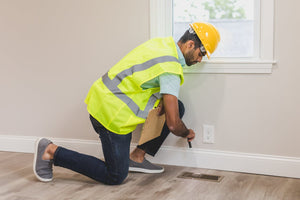How to Avoid Storage Unit Scams When Preparing Your Home for Sale

How to Avoid Storage Unit Scams When Preparing Your Home for Sale: Selling your home is stressful. You’re cleaning, staging, and decluttering. Renting a storage unit often feels like a simple fix. It helps keep your home looking tidy for buyers. But many sellers don’t know that scammers target people in this exact situation. Storage scams are real. They can cost you time, money, and peace of mind. In this guide, you’ll learn how to avoid storage unit scams using smart, simple steps. Every tip is designed to protect you from shady operators and help you make safe choices.
The Hidden Risks of Using Storage During a Home Sale
Scams come in different forms. Some fake companies take your deposit and vanish. Others hide extra fees in fine print. Some will quote one rate and then raise it once your stuff is locked away.
As a matter of fact, many people don't notice issues until it’s too late. In contrast, honest companies show their full pricing upfront and explain their terms clearly. Some scammers use real business names and fake websites. That makes it harder to tell what's real and what’s not.
If you're rushed or stressed, it's easier to miss red flags. Another key point, scammers know you're distracted and willing to act fast. That’s why many home sellers are often easy targets.

Research Before You Reserve: How to Vet a Storage Company
Start with research. Always search for businesses online. Look at reviews from multiple sources. Check Google, Yelp, and the Better Business Bureau.
With this in mind, don’t rely on one platform only. Look for complaints about billing, damage, or unexpected fees. Use state websites to confirm licenses. A legal business should be registered and have a clear physical address.
Besides, call the facility. Ask questions. Do they answer quickly? Do they sound professional? That alone can tell you a lot.

Watch for Last-Minute Pressure Tactics and False Urgency
Scammers often create a sense of urgency to force quick decisions. They’ll tell you a unit is in high demand or claim there's only one left. These pressure tactics are designed to make you act without thinking. You may feel rushed, especially when preparing your home for sale, but stopping to verify details can save you from serious problems.
As an illustration, some fake companies will offer a steep discount—but only if you book right away. Others may say the offer expires in an hour. This is a red flag. Legitimate businesses give you time to read contracts and ask questions.
High-pressure sales often lead to poor choices. You may skip reading the agreement or miss hidden fees. Scammers count on that. In contrast, honest storage providers want you to understand what you're paying for. They won’t push you into signing anything on the spot.
With this in mind, stay calm and take your time. Ask for a written quote. Review the contract at home. Check reviews again. If someone is rushing you, it’s often a sign that something’s wrong. Being alert helps you avoid storage unit scams during moves and lets you have a safer moving experience overall.
It’s your right to ask questions, compare options, and walk away if things feel off. In short, don’t let fake urgency push you into a bad deal.

Read the Fine Print: Avoid Contracts That Trap You
Before you sign anything, read every word. Look for hidden fees like admin charges or cleaning costs. Ask about automatic renewals and price changes.
Of course, good companies will show you a simple, clear contract. If they avoid your questions, that’s a red flag. Check how long the contract lasts. Know how to cancel or move out.
Besides, take a picture of the signed agreement. Keep it in your records. It could help you later if there's a dispute.
Don’t Fall for Unrealistically Cheap Offers
Scam ads often show very low prices to get your attention. They’ll say $1 for the first month. Then come extra fees and rate jumps.
In short, avoid deals that seem too good. They usually are. Real companies charge fair rates. Compare local prices. Ask for a full breakdown of fees before you agree.
Similarly, check if insurance is included. Some places will add it without telling you. Others require it but sell it at inflated prices.
Visit the Facility In Person (or Virtually)
See the place before you trust it with your belongings. Check if it looks clean and safe. Make sure there are cameras, fences, and someone on site.
As an illustration, a good facility will have security gates, video surveillance, and proper lighting. Ask for a tour. If you're far away, request a video call.
Nevertheless, do not book without seeing where your items will be kept. A scammer may give you an address that doesn’t match the actual site.
Use Secure Payment Methods Only
The payment method matters more than most people think. Many victims of storage scams lose money they can’t get back. That’s why you must choose a safe, trackable way to pay. To avoid storage unit scams, always use a credit card. It offers protection and gives you the power to dispute charges if something goes wrong.
As a matter of fact, scammers often request payment through wire transfers, prepaid debit cards, or peer-to-peer apps. These methods are hard to trace and nearly impossible to reverse. In contrast, legitimate storage companies use secure systems and accept credit cards or bank payments tied to verified business accounts.
Always double-check the business name on your payment receipt. It should match the name shown on the website and contract. If it doesn’t, that’s a red flag. Besides, ask for a detailed invoice that clearly lists all charges. Keep a copy of every receipt, email, or confirmation you receive.
Ask These Questions Before You Sign Anything
Ask detailed questions to test the company’s honesty. What is the total move-in cost? Are there extra charges? Is insurance required?
What happens if you're late on payment? Is there a grace period? How do you access your unit? When is the office open? In contrast, a scam company may give vague answers or pressure you to hurry. Always walk away if things feel off.
How to Avoid Storage Unit Scams When Preparing Your Home for Sale
Let’s bring it all together. You want your home to look its best. Also, renting storage can help. But don’t rush.
Start early. Take time to check each company. Not to mention, always use a checklist before signing up. That includes license verification, contract review, price breakdown, and secure payments.
Ask questions. Visit or video chat with the site manager. With this in mind, don’t hand over money until you’re 100% sure the business is real.
Stay organized. Keep your documents, photos, and receipts. These can help you if you need to dispute charges later.
Summary: Secure Your Storage and Your Sale
Storage scams can ruin the selling process. But they’re easy to avoid with the right steps. Start by doing your homework. Stick with licensed, reviewed companies. Ask smart questions. Pay securely. Always read the contract.
Emphasize this—you must protect your belongings. Learning how to avoid storage unit scams is just as important as staging your home. A little caution now can save you big problems later.
- Home Staging Warehouse






